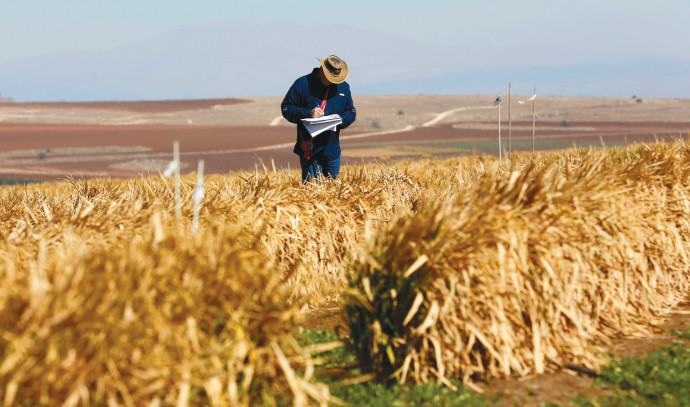I’ve just returned from my weekly foray to the supermarket. There, I saw a miracle – bins full of delicious fresh fruits and vegetables and fresh eggs, all of it produced in Israel.
This, in wartime, even though foreign farm workers have left; many Western Negev and Northern Galilee cities and towns, kibbutzim and moshavim have been evacuated; and many fields, orchards, hothouses, hen houses and dairy farms have been damaged and abandoned, or destroyed by Hamas and Hezbollah rockets.
Yuval Lipkin, deputy director-general of the Ministry of Agriculture, says that Israelis consume 200 million eggs monthly. Some 70% of laying hens are in the Galilee and Golan, now under attack, he explains.
Western Negev farms are the vegetable garden of Israel, claims Amit Yifrach, general secretary of the Moshavim Movement and chairperson of the Israel Farmers Federation. He says that pre-war, “75% of vegetables, 20% of fruit, and 6.5% of dairy products” were produced there.
Today, thanks in part to thousands of volunteers who regularly report to help pick and prune, and thanks to the stubborn resilience of farmers, many of whom refuse to evacuate, and risk their lives to continue to feed us, we Israelis enjoy bountiful fresh food. I purposely buy from supermarkets that favor Israeli produce rather than those that sell cheaper, less tasty imports.
Indeed, a miracle of resilience – one we must not take for granted.
This is not a time for complacency. Israel’s Agriculture Ministry stated on December 10 that “Israeli agriculture is in one of the biggest crises we have known since the establishment of the state” 75 years ago.
I spoke with my Neaman Institute colleague Eyal Shimoni, a veteran foodtech expert, innovator, mentor, entrepreneur, and former senior Strauss manager. I asked him to name some leading innovative technology-intensive start-ups in foodtech and agrotech. (FoodTech is the use of technology to improve and innovate processes related to the production, distribution, and consumption of food. AgroTech refers to technologies applied to agriculture to enhance crop yield, reduce environmental impact, and improve farming practices. Among these technologies are supply chain management; food processing; biotechnology; digital platforms; sustainability solutions; data analytics’ and artificial intelligence.)
In response to my request, Shimoni took the trouble to canvass his knowledgeable acquaintances in this field and came up with a remarkable list (although partial, as there are hundreds of superb food and ag tech start-ups in Israel).
Here it is. It is only a tiny sample of the phenomenal Israeli creativity bubbling in this exciting realm – crucial, if the world is to feed its hungry people in the future.
FOODTECH
Cultivated meat
Aleph Farms was co-founded in 2017 by the Israeli foodtech incubator The Kitchen, of Strauss Group Ltd., and Prof. Shulamit Levenberg, dean of the Technion’s Faculty of Biomedical Engineering. Its product offerings include ground meat, beef burger patties, and steaks. The company uses proprietary 3D bioprinting technologies by using fat cells, support cells, muscle cells, and blood vessel cells to develop tissues into meat products.
Another company, Believer Meat, was founded in 2018. It supplies lab-grown meat with a highly sustainable manufacturing model, resulting in 99% less land use and 80% fewer greenhouse gas emissions than traditional meat.
Dairy protein
ReMilk, founded by Aviv Wolf, announced last year that it will open a huge facility for producing cow-free milk in Denmark. [See “Meat or Milk,” Jerusalem Report, Sept. 4.] It makes milk proteins using a yeast fermentation process. The resulting milk proteins are chemically identical to those produced by dairy cows but are free of lactose, cholesterol, growth hormones, and antibiotics that often occur in dairy cows.
ImaginDairy was founded by Eyal Afergan, Arie Abo, and Prof. Tamir Tuller. Its dairy proteins possess the same flavor, functionality, experience, mouthfeel, and nutrition as the cow-required dairy. Its animal-free dairy products are also lactose-free, growth hormone-free, and cholesterol-free. French dairy giant Danone has made a strategic investment in the compamy.
SweetTech
Amai, which means “sweet” in Japanese, was founded in 2016 by Ilan Samish, who serves as its CEO. Amai develops sweet protein, inspired by nature, built with biology through a natural fermentation process. It is the sweetest protein in the world, which is also thermostable (resistant to heat) and enables significant sugar reduction without affecting taste. Other alternative designer proteins in the pipeline include meat, milk, and plant proteins.
Incredo (formerly DouxMatok) is based in Petah Tikva and was founded in 2014. It develops flavor ingredients for the food and beverage industry. The company offers sugar and salt reduction solutions while retaining the same sugar and salt experience. It has developed a low-calorie sugar-based class of sweeteners based on its proprietary technology. Incredo’s technology binds real cane or beet sugar with trace amounts of a natural carrier that is able to reduce the amount of sugar in foods by 30% to 50%. This means that people can eat less of it but still get the same effect of taste, mouthfeel or texture — without changes to the ingredients.
O’Taste was founded by Guy Ben Zvi. It developed a natural enhancement platform for natural taste. It increases taste tenfold and can be used for both sweet and savory, thus enabling sugar and salt reduction. Its enhanced natural sugar is ten times sweeter than regular sugar. This allows food manufacturers to cut down on sugar in their products by 70% to 80% while keeping the same natural taste and sweetness.
Food intelligence
Tastewise was founded by Alon Chen and Eyal Gaon. It offers AI-based food intelligence solutions for restaurants. The company’s platform analyzes data points from menus, reviews, home recipes, and social media posts to provide insights on customers’ food trends, behavior, and eating choices in real time. Its app uses machine understanding of the text, context, and image to understand food, consumption, and eating habits.
Agrotech
Here are eight cutting-edge agrotech start-ups suggested to me by Shimoni.
SupPlant, based in Afula, is an Israeli precision agriculture and smart farming company. SupPlant’s technology enables farmers to improve yields, productivity, and water use efficiency on a large scale and become less vulnerable to volatile weather conditions. The technology combines data collected from soil, plant, and weather sensors to understand and identify the main parameters affecting the optimal performance of plants.
Combining and analyzing all the data, in real time, using intelligent algorithms, SupPlant provides a precise irrigation plan and recommendations on daily and weekly bases to maximize crops and budget. The company recently launched a sensor-less technology, which has already assisted 500,000 female maize farmers in Kenya over their last growing season.
BlueWhite’s founders are Ben Alfi, Yair Shahar, and Aviram Shmueli. It is an innovative company in the field of autonomous driving of tractors in orchards – combining hardware and software for fleet and data management so farms can operate from anywhere. It is an add-on to regular tractors.
Arugga replaces bees and workforce. Co-founders Ido Geltner and Eytan Heller developed ground robots to treat and monitor individual plants in the greenhouse. It is the first company to commercialize a robot that successfully replicates bumblebee pollination in tomato greenhouses. Polly, Arugga’s robotic platform, supports several modules: robotic pollination; plant lowering; non-contact pruning; and pest and disease detection. Its first commercial pollination robots are now deployed in Australia, US, Canada, and Finland.
CropX is a farm management system that connects farm data, real-time conditions, and agronomic knowledge to provide guidance for successful and sustainable farming, while aggregating all agronomic farm data in one place for easy tracking and sharing. It was founded in 2013 in New Zealand to push innovations in soil sensor technology and digital platforms and moved to Israel in 2017 to draw from Israel’s expertise in water-efficient irrigation technologies.
BeeHero was founded by a team of veteran beekeepers, serial entrepreneurs, renowned biologists, and data scientists concerned about the global loss of pollinators. Studies showed that inadequate pollination caused at least a three to five percent loss of fruit, vegetable, and nut production. BeeHero technology provides farmers with improved pollination and optimizes hive placement by identifying farms’ needs for full coverage, with data-driven oversight of the entire operation, from real-time colony health insights to pollination activity.
Equinom was founded by Gil Shalev in 2012. Its Manna™ platform uses artificial intelligence to develop premium-quality, high-yield, non-GMO ingredients naturally – in half the time of traditional crop development cycles.
MetoMotion, founded by Adi Nir and Omer Nir, developed an advanced robtics platform for precision greenhouse farming. Its system identifies fruit based on ripeness, and then picks and packs it directly into a box. GRoW technologies include a 3D vision system for identifying ripe crops, an end-effector for damage-free harvesting, and analytical software that is based on computational algorithms and artificial intelligence.
Brevel was founded by brothers Yonatan, Matan, and Ido Golan. Its innovative technology unlocks the full potential of microalgae, creating an alternative protein that is perfect for mass production. Cultivating microalgae uses just a fraction of the land and water needed for other alternative protein sources. In addition, microalgae have an insignificant carbon footprint.
SHIMONI AND I share a passion for distance running. I can no longer run marathons, but Shimoni? He is at another level. He recently completed the fourth of the incredible 4 Deserts Ultramarathon Series covering 1,000 km. in four 250-km. multi-day, self-supported races: the Namib Race (Namibia); Gobi March (Mongolia); Atacama Crossing (Chile); and The Last Desert (Antarctica).
Ultramarathons are a perfect metaphor for Israel today. Israel will be fighting its enemies in a very hard, lengthy “ultramarathon” at high and low intensity for years. In previous wars, Israelis have proven resilient, able to bounce back. However long and hard the current war is, Israeli agriculture in the North and the South will rebound and renew itself, energized by a host of hi-tech start-ups that are reinventing how food is produced.
Shortly after October 7, the Israeli government established the Renewal Administration (Minhelet Tekuma), with a large budget to rebuild and renew the lush agriculture in the Western Negev. [Full disclosure: The S. Neaman Institute is providing supporting research.] The goal is not just to rebuild what was lost but to build back better, with cutting-edge technology.
Hi-tech: Welcome to our farms! ■
Farm of the future
Shmulik, a longtime kibbutznik, rises early, as he has for over 60 years. He spoons coffee into a mug (no sugar) and adds boiling water, stirring vigorously.
“Habakuk, report!” he barks into his cellphone.
“Sir,” a gravelly robot voice responds. “Picking peppers at 6 a.m. Plowing fallow in the southeast field. Pollinating the zucchini. Micro-chromosome research ongoing in the R&D lab.”
Shmulik sips his coffee, opens the sliding glass doors, and steps out to his patio. He sees the bright-red self-driven tractor plowing precise furrows, guided by GPS in a nearby field. Next to the field, robots trundle down rows of ripe red peppers, picking, boxing, and packing them.
Shmulik looks toward the west and watches as another robot delicately brushes pollen from a zucchini flower’s anthers (the male part of the plant), then takes the pollen to the stigma (the female part) of another plant. The little robot even buzzes – a quirky touch by a start-up entrepreneur. Bees buzz when pollinating, to shake pollen from flowers onto their body.
With only dark grounds left in his coffee cup, Shmulik goes into the kitchen and washes the cup carefully – his wife doesn’t tolerate leaving dirty cups in the sink. Then he goes out and walks for 10 minutes to a four-story building. This is where the kibbutz has its vertical agriculture: several stories of vegetables grown hydroponically (in water, without soil) and aeroponically (in air). He picks a cherry tomato and chews it. It’s sweet, juicy, delicious.
Nearby is the kibbutz’s R&D lab. Shmulik heard that the agronomists there are using something called micro-chromosomes to improve the egg-laying potential of the kibbutz’s famous hens. (“It’s not GM!” – genetically modified – the experts insist. “GM” is a curse word in some markets.)
Next, Shmulik strolls over to the long building that houses the kibbutz dairy. For years, he and many other kibbutz members worked there, milking cows and later, hooking them up to the milking machines. No longer. It is all automated. Cows walk by themselves to the entrance, are showered, their udders are cleaned, they are milked, and they exit to feeding troughs. One of the kibbutz cows, Havatzelet, holds the Israeli record, producing 9,000 gallons of milk in a single year. 9,000!
Shmulik muses that he misses the old ways of milking. He got to know each cow then, by name, and knew how likely each one might deliver painful kicks.
Later that day, Shmulik will bring a visitor – his grandniece from Kfar Saba – to the hen house. She is an animal rights activist and wants to see for herself that the chickens are treated humanely. She is pleased that the hens are not cooped up in pens but roam freely. Their eggs drop onto a conveyor belt, are candled, cleaned, and packaged, all automatically.
Okay, Shmulik is fictional. But the farm of the future is real – and it is happening now, in the present.
The writer heads the Zvi Griliches Research Data Center at S. Neaman Institute, Technion. He blogs at www.timnovate.wordpress.com.




